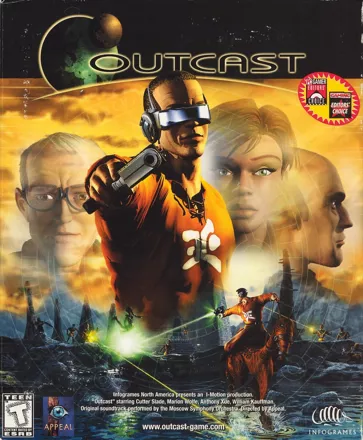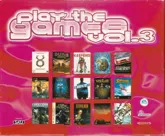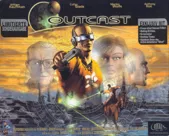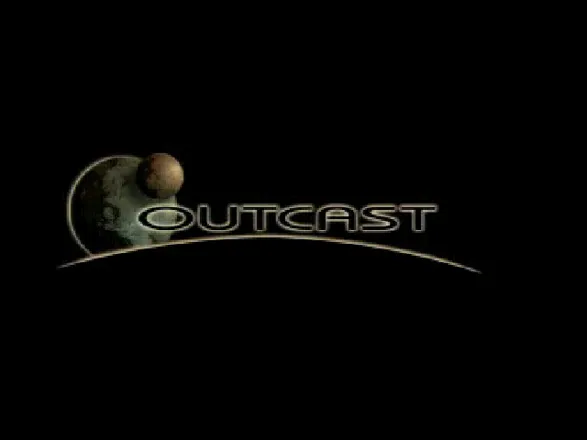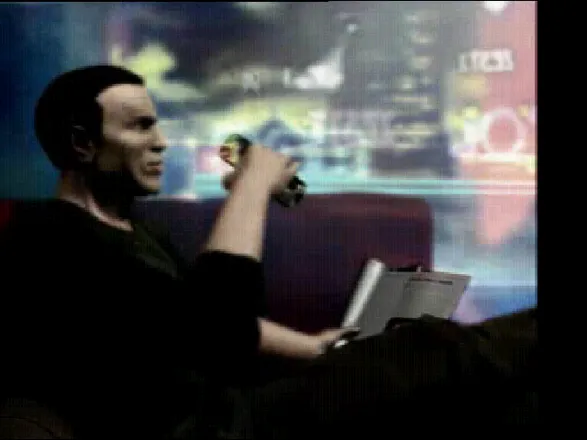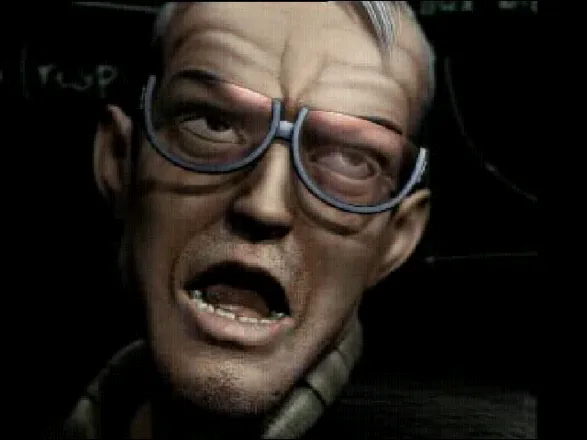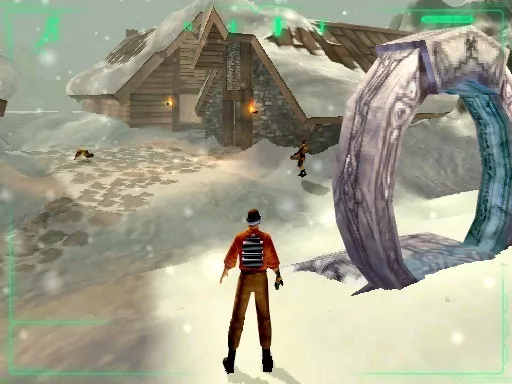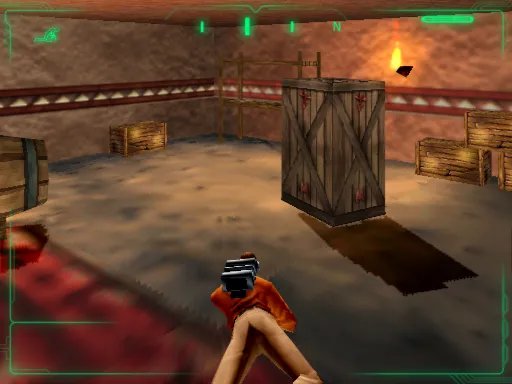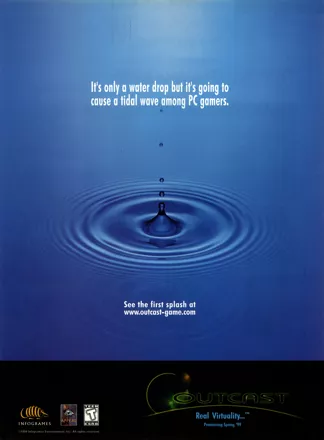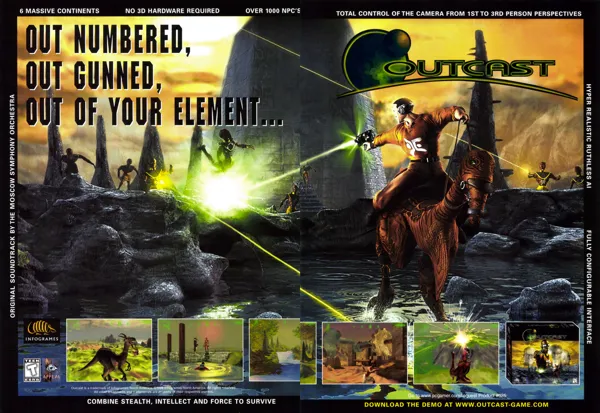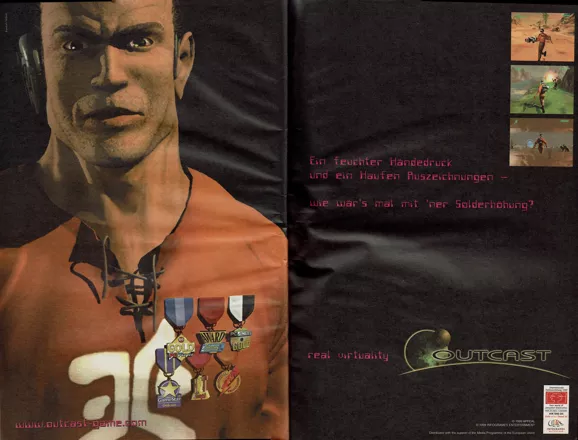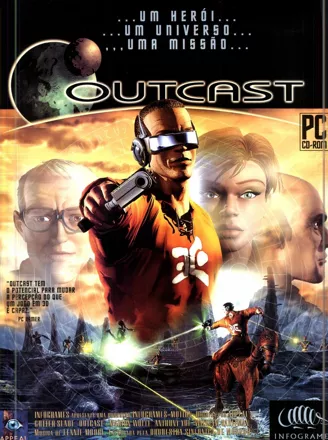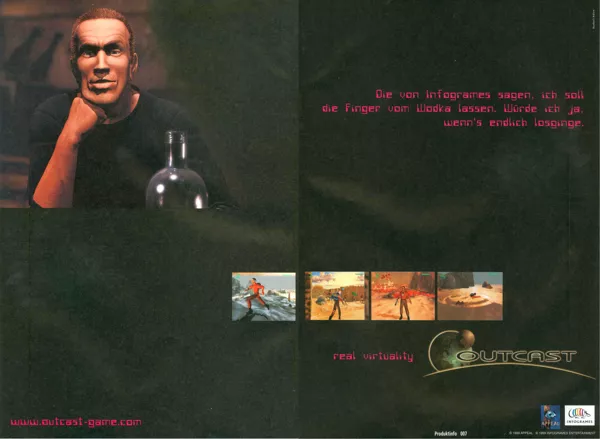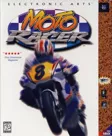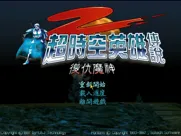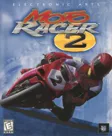Outcast
-
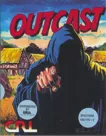 Outcast
(1987 on
ZX Spectrum, 2020 on
Antstream)
Outcast
(1987 on
ZX Spectrum, 2020 on
Antstream)
Description official descriptions
In the year 2007, a parallel universe is discovered by scientists. The U.S. government sends a probe to that universe and learns of the existence of an entire alien civilization there. However, an apparently hostile alien damages the probe, leading to the creation of a black hole threatening the very existence of our own world. Former U.S. Navy S.E.A.L. Cutter Slade is assigned to escort three scientists to the parallel universe in an attempt to repair the probe and avert the danger.
Upon arrival, Cutter is separated from the scientists and is greeted by the local inhabitants, the Talan. It appears that their world, Adelpha, has its own troubles: a mysterious being known as Faé Rhan has been assembling an army consisting of Talans who think themselves superior to the rest of the population and willing to rule over them with violence. Cutter is proclaimed the Ulukai, a savior mentioned in a prophecy, and entrusted with the task of retrieving five sacred relics needed to overthrow Faé Rhan - all while trying to locate the scientists and save the Earth as well in the process.
Outcast is a 3D third-person (with optional first-person view) action game with adventure elements. In search for five sacred relics, the protagonist travels through the five continents of Adelpha (plus one tutorial island). Each land has its own landscape (mountains, lakes, forests), populated areas, as well as dozens of minor problems - small quests that the hero is required to solve. Most Talans populating the world can be conversed with about a variety of topics. A large portion of the game consists of finding key characters and performing quests for them; some of these are optional, though most must be completed in an adventure-like linear fashion in order to advance the plot. Cutter is free to travel between the continents using special portals.
Apart from exploration and completing quests, Cutter will also fight many guards and creatures. At his disposal are six futuristic weapons (railgun and others); ammunition for those guns is scattered around and can also be produced by mixing items. Aiming help is provided in the form of laser sights. Sneaking up to the enemy and punching him out silently is also possible. Gadgets such as a holo-decoy can be used to help Cutter gain the upper hand in combat. The player character can also jump, climb, swim, dive, crawl, and ride a local animal known as Twon-Ha for faster travel.
Spellings
- 时空英豪 - Simplified Chinese spelling
Groups +
Screenshots
Promos
Videos
Add Trailer or Gameplay Video +1 point
See any errors or missing info for this game?
You can submit a correction, contribute trivia, add to a game group, add a related site or alternate title.
Credits (Windows version)
161 People (135 developers, 26 thanks) · View all
| Presented by | |
| Design | |
| Programming | |
| Additional Programming | |
| Graphics / 3D Programming | |
| Music / Sound Programming | |
| [ full credits ] | |
Reviews
Critics
Average score: 86% (based on 36 ratings)
Players
Average score: 3.9 out of 5 (based on 93 ratings with 12 reviews)
One of the best action adventures ever made.
The Good
Once in a while, a game so incredibly good shows up that trying to think of a lot of good points is easy but trying to pin one down as a place to begin with is very hard. Those who have played Outcast and are reading this will know why I'm having trouble figuring out what I should begin with. The truth is, Outcast is good. No I take that back, Outcast is amazingly good. When it was first released, I had an interest in it but for reasons of money among other things, I never got around to buying it. Recently, I found it as a budget title and decided to get ahold of it. Now that I've played through this very long game, I can't believe I didn't get it sooner.
Where was I? Ah yes, the good points! Where to start... Well I could tell you about the dozens of absorbing quests you must undertake, or the plethora of sub quests you can find. I could talk about the huge and lush world you'll be completing them in, or the brilliant sound and voice acting. Then again I could just talk about the music, the beautifully written orchestral score performed by the Moscow Symphony Orchestra is utterly phenomenal. More than once I have found myself popping the cd into the cd player and listening to it while I was working or relaxing. Visually the game is strong and even in todays games I have not seen a better rendition of water. In Outcast the water shimmers, ripples and reflects like nothing I've ever seen before in a game. Gameplay is so much fun it's hard to stop and the story is also well put together. I could go on and on about this game but I think my enthusiasm for it speaks volumes by itself so I'll just go on to the easiest section...
The Bad
For the first time in all the reviews I've written I'm at a loss. I can't think of anything I really hated about this game but if you push me then I guess the story was a bit less complex than I'd like and the character development was in some places not as high as others. I am really reaching here by the way.
The Bottom Line
You must get this game. That's all there is to it. You have no excuse since it's now a budget title which makes getting it almost criminal. If you play games then go and get it NOW. About the only people who I think should avoid it are those who loathe action of any kind in their games. On second thought even those people should try this, you might be swayed.
Windows · by Sycada (177) · 2001
Heaven's Gate: The Computer Game
The Good
Well, it has an impressive initial impact. For a few minutes it seems as if you have been dropped into a deep, interactive world which you can explore at your leisure; the environments are very attractive, using smooth voxels, whilst the sound and music are professionally done and, in the latter case, expensive. Indeed this game reeks of money and talent, and like many expensive collections of expertise it is absolutely hollow inside.
The Bad
As explained quite well in some of the other reviews, the actual gameplay is dreadful, dated, linear, uninvolving. Each level involves running up to a character, listening to a dull conversation, running elsewhere to pick up three or four objects, running to a second character in order to repair the objects, running to a third character in order to find the location of a fourth object, running to the fourth object, running to the second character to find the new location of the first character, running to the first character to hand him 'object Z', at which point he tells you that you need to locate character X in order to embark on a very similar quest. The whole game is nakedly a modular series of looping flowcharts, with no enjoyment at all.
The 'sci-fi' angle involves taking a bunch of quasi middle-eastern characterisations and environments, renaming everything (so that instead of locating Farmer Giles and asking him for a pair of 'scissors' you have to locate Qu'loth and ask him for his 'maarg', or his 'tarrn', or his 'tazmak'), and little else. The game is thus very, very complex but utterly shallow, indeed it is meaningless, impossible to relate to or feel anything for. It reminds me a great deal with 'X: Beyond the Frontier' in that respect; attractive, quality stuff, no game.
The Bottom Line
The nightmare is that this game showed enormous promise. Each level is like a functioning city/village, although sadly not loose enough for you to simply wander around, playing with things. If it had been married to some kind of RPG it would have been excellent, but it isn't, the game itself is no more advanced than a simple Sinclair Spectrum arcade adventure.
I could feel my initial intrigue - the game is very, very attractive - wearing off, until by the second level I was playing it out of sheer bloodymindedness. Again, this reminds me of 'X: Beyond the Frontier' and, oddly, 'Serious Sam', another game which had promise but ran out of ideas very quickly. If only...
Windows · by Ashley Pomeroy (225) · 2005
My absolute favourite game ever!!
The Good
This game is absolutely great! Since the first time I played it, I felt almost one thousand different emotions listening to the best game soundtrack ever written (mixed with excellent sounds), and walking on a land that for the first time I looked as real!! Outcast made me know Voxel graphics, whose I'm a fan now, and I think that none of the modern pathetic polygon 3D engines would have looked so amazing as Outcast's!! Besides the wonderful graphics and music, Outcast has one of the greatest storyline ever written for a game! The whole game is amazingly cinematographic, playing it you'll sometimes wonder if you're just playing it or if you're LIVING what could have easily been a movie! There are thousands of people to talk to, to get informations you'll many times have to do something in exchange, and since the world you've fallen to (Adelpha) is divided in six huge regions, you'll have a lot to do to complete the game! Besides you'll be free to do whatever you want: you can be a classic hero, helping everyone (and consequently get more help from the people), or you can be a lone bastard, killing everything in sight (obviously being forced to make everything of your own): just take care of the fact that your deeds will rapidly spread into the six regions, so people will avoid you if you didn't act as the hero they initially think you are! Strategic elements are really strong too: to weaken the enemies you'll be able to cut their resources by convincing the people stopping working for them: this can be done by doing something in exchange, for example saving an important personality, etc. Finally, there are many quests and sub-quests in the game: some are necessary to complete the game, some just help you to get more money, weapons and so on: try to make them all! ;-)
The Bad
I couldn't find anything bad in this game, I love it too much! Well maybe battles are a bit too easy (but I know many people think they're too tough, instead!). I know a lot of people didn't like the Voxel engine: I repeat it's the more realistic 3D engine I ever saw in a game, so it certainly is not in my BAD section. Besides, you'll have to talk a lot: someone could find this a little annoying, considering that in each dialogue a new person will be mentioned, and it could be a little hard to keep everything in mind (but there's a Notepad annoting everything new you know, so this isn't a real problem!! ;-)); I actually didn't, I really liked the complexity of the whole situation.
The Bottom Line
This game rocks! If you've never played it, you don't know what you're missing!! Its atmosphere is amazing, if you're a science-fiction fan you HAVE to play it at least one (well, I did it three times! ;-))
Windows · by Delusion Master (131) · 2000
Trivia
1001 Video Games
Outcast appears in the book 1001 Video Games You Must Play Before You Die by General Editor Tony Mott.
Cancelled Dreamcast version
A Dreamcast version was planned by Infogrames, which would feature a new, fully polygonal engine to replace the original one. However, thanks in no small part to Outcast's small sales and the self-destruction of the Dreamcast console, on 22 September 2000 Infogrames announced the cancellation of the port's development. This is sad indeed, since Infogrames had hinted that a 3D acceleration patch for the PC version would be available thanks to the Dreamcast port (since the console uses DirectX as its core API for 3D acceleration).
Graphics engine
A common misconception is that Outcast employs a voxel engine. Franck Sauer, though, said in an interview with gaming magazine "Strana Igr": "We've all misused the term voxel for what actually is just an height field with some software raycasting".
The engine allows for a complex architecture and a wide range of sight. However, it features only low resolutions up to 512 x 384, does not support 3D accelerator cards and requires a potent processor (preferably 500 Mhz) to run smoothly.
Legacy
In November 1999, Appeal announced a sequel Outcast 2: The Lost Paradise, a PS2 game with a PC release to follow. Appeal however declared its bankruptcy on 12 August 2002 and the game was canceled. A major part of the team moved to elseWhere Entertainment and a petition was started to persuade Infogrames to allow Elsewhere Entertainment to use the Outcast license, but with no result. A team called Eternal Outcasts started working on Open Outcast as a mod for different types of engines, first the one of Gothic, then the Crystal Space engine, next CryEngine 2 and finally settling on CryEngine 3. After two tech demos (Oasis 1.0 & 1.1) that can be played as mods through Crysis Wars, the project was re-branded on 1 April 2013 as Outcast: Legacy of the Yods.
On 3 July 2013, it was announced that Yves Grolet, along with the other two original Appeal founders Franck Sauer and Yann Robert, bought back the rights to Outcast from Atari. The game will be developed through Grolet's company Ama Studios and Sauer and Robert will work for Ama through their own company Fresh3D. Tentatively dubbed Duality, it was then confirmed that it would become the official successor to Outcast. Duality was already announced as the third Ama title at least one year earlier, but with no details except for the title.
The rights ended up with yet another studio which was formed by Fresh3D staff, Appeal Studios. The rights were acquired by THQ Nordic in 2019, followed by the studio itself in 2021.
Outcast got an updated release Outcast 1.1 in 2014, a remake Outcast: Second Contact in 2017, and finally a proper sequel Outcast: A New Beginning in 2024.
Outtakes
Appeal created 15 movie outtakes for Outcast. They could be downloaded as mpg-files from the game's official website. Ideally, any viewer should have played the game, in order to understand the puns.
Promotion
A lengthy gameplay demonstration of the game was shown on the main projection screen at the Belgian demo party Wired 1998, nearly a year before its official release.
References
- Listen closely, and it's possible to recognize the main notes of Luke's Theme from the Star Wars soundtrack being played by some of the flute players in the region of Okriana, particularly those west and east of the palace. Fitting, considering the city is in the desert.
- The word Okriana could be seen as an anagram of the Russian word okraina, which means the outskirts. However, according to an interview with Franck Sauer, it actually comes from ochre, the yellow colour that dominates the area.
Save
The crystalline object used to save your game is called a Gaamsav. Carefully listening to that name makes its use more than apparent.
Voice actors
In both the French and the German version of the game, the actors providing the main character's voice are the dubbing voices of Bruce Willis in the respective languages: Patrick Poivey and Manfred Lehmann.
Awards
- Computer Gaming World
- March 2000 (Issue #188) – Adventure Game of the Year
- GameSpot
- 1999 - Adventure Game of the Year
- GameStar (Germany)
- Issue 03/2000 - Best Sound in 1999
- Issue 12/1999 - #57 in the "100 Most Important PC Games of the Nineties" ranking
- PC Powerplay (Germany)
- Issue 11/2005 - #8 Game Which Absolutely Needs A Sequel
Information also contributed by -Chris, Lumpi, Sciere, shifter, Supernintendo Chalmers, Xa4, Zack Green, and Zovni.
Analytics
Related Sites +
-
Open Outcast
A fan-made sequel in the works. The team intends to use the CryEngine 2 for terrain modelling. Well worth a look. -
Outcast Hints
Alex Burrell wrote these excellent hints for Outcast for the Universal Hint System. -
Outcast II.net
A very comprehensive site with news, resources, art, guides and interviews.
Identifiers +
Contribute
Are you familiar with this game? Help document and preserve this entry in video game history! If your contribution is approved, you will earn points and be credited as a contributor.
Contributors to this Entry
Game added by robotriot.
Additional contributors: -Chris, Unicorn Lynx, Jeanne, Chentzilla, Sciere, CaesarZX, Cantillon, Zeikman, Patrick Bregger, Plok, FatherJack.
Game added November 1, 1999. Last modified March 14, 2025.


